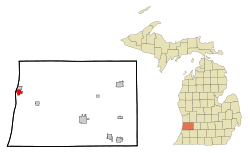- Douglas, Michigan
-
Douglas, Michigan — City — Location of Douglas, Michigan Coordinates: 42°38′34″N 86°12′22″W / 42.64278°N 86.20611°WCoordinates: 42°38′34″N 86°12′22″W / 42.64278°N 86.20611°W Country United States State Michigan County Allegan Area – Total 1.9 sq mi (4.9 km2) – Land 1.8 sq mi (4.5 km2) – Water 0.1 sq mi (0.3 km2) Elevation 610 ft (186 m) Population (2000) – Total 1,214 – Density 691.6/sq mi (267.0/km2) Time zone Eastern (EST) (UTC-5) – Summer (DST) EDT (UTC-4) ZIP code 49406 Area code(s) 269 FIPS code 26-22740[1] GNIS feature ID 0624823[2] Douglas (officially known as the City of the Village of Douglas) is a city in Allegan County in the U.S. state of Michigan. The population was 1,214 at the 2000 census. The city is surrounded by Saugatuck Township and the city of Saugatuck is adjacent on the north.
On December 13, 2004, residents voted to adopt a charter changing the status of the village into a city form of government. Under Michigan law, cities are independent entities whereas villages are part of the township. The official name is City of the Village of Douglas.
Douglas, originally known as Dudleyville, was first settled in 1851 as a lumber mill town. In 1861, residents changed the name to Douglas. Reportedly the name was chosen to honor the American statesman Stephen A. Douglas, but other reports indicate that a relative of the original owner of the land also suggested the name because he came from Douglas, the capital of the Isle of Man. Douglas was incorporated as a village in 1870.
Area sawmills provided much of the lumber used to rebuild Chicago after the Great Chicago Fire of 1871. After most of the harvestable trees in the area were cleared by the lumber industry, the area became a center for growing and shipping fruit, especially peaches. Tourism and resorts also became an important part of the area economy.
Contents
Geography
According to the United States Census Bureau, the city has a total area of 1.9 square miles (4.9 km2), of which, 1.8 square miles (4.7 km2) of it is land and 0.1 square miles (0.26 km2) of it (6.91%) is water.
Demographics
As of the census[1] of 2000, there were 1,214 people, 587 households, and 284 families residing in the city. The population density was 691.6 per square mile (266.3/km²). There were 853 housing units at an average density of 486.0 per square mile (187.1/km²). The racial makeup of the city was 96.87% White, 0.58% African American, 0.08% Native American, 0.16% Asian, 0.74% from other races, and 1.57% from two or more races. Hispanic or Latino of any race were 2.64% of the population.
There were 587 households out of which 18.9% had children under the age of 18 living with them, 35.6% were married couples living together, 9.4% had a female householder with no husband present, and 51.6% were non-families. 43.6% of all households were made up of individuals and 19.1% had someone living alone who was 65 years of age or older. The average household size was 1.91 and the average family size was 2.60.
In the city the population was spread out with 16.1% under the age of 18, 4.1% from 18 to 24, 23.4% from 25 to 44, 30.7% from 45 to 64, and 25.6% who were 65 years of age or older. The median age was 48 years. For every 100 females there were 86.8 males. For every 100 females age 18 and over, there were 87.1 males.
The median income for a household in the city was $41,250, and the median income for a family was $49,750. Males had a median income of $38,750 versus $28,906 for females. The per capita income for the city was $26,517. About 8.7% of families and 10.3% of the population were below the poverty line, including 14.5% of those under age 18 and 8.5% of those age 65 or over.
Other notable residents
- George Washington Maher - early 20th century Prairie School style Architect
References
External links
- City of the Village of Douglas official website
- Saugatuck/Douglas Convention & Visitors Bureau
- Saugatuck-Douglas Historical Society
- Historic Saugatuck/Douglas
- Local Business Assoociation
- Saugatuck Public Schools
- Saugatuck-Douglas District Library
- Business Week's Best Places to Raise Kids
Municipalities and communities of Allegan County, Michigan City Villages Charter
townshipGeneral law
townshipsUnincorporated
communitiesBradley | Burnips | Glenn | Hamilton | Hilliards | Macatawa | Moline | New Richmond | Pullman | Shelbyville
Footnotes ‡This populated place also has portions in an adjacent county or counties
Categories:- Populated places in Allegan County, Michigan
- Cities in Michigan
- Populated places established in 1851
Wikimedia Foundation. 2010.


